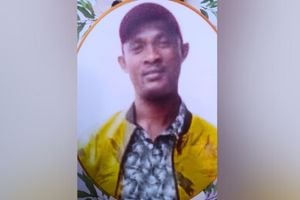Explainer: How to report police misconduct in GBV cases

Gigiri Police Station in Nairobi in this photo taken on August 20, 2024. If one encounters police harassment or misconduct when reporting a GBV case, they can file a complaint with the National Police Service's Internal Affairs Unit.
What you need to know:
- In 2019, Evans' 13-year-old daughter was sexually assaulted. When he reported the crime, he encountered a disheartening response from law enforcement.
- If you encounter police harassment or misconduct when reporting a GBV case, you can file a complaint with the National Police Service's Internal Affairs Unit.
In 2019, Evans’* world was shattered when his 13-year-old daughter fell victim to sexual assault by the son of a local influential figure in Busia County. When he mustered the courage to report this heinous crime, he encountered a disheartening response from law enforcement that would leave him questioning the very foundations of justice in his country.
"After recording the incident, the police I found at the desk said there's little they could do unless I facilitated them," Evans recalls, his voice tinged with a mixture of pain and frustration.
Despite having recently battled illness and finding himself without funds, Evans' determination to seek justice for his daughter drove him to borrow Sh5,000. This money, meant to ensure the suspect's arrest, became a bitter reminder of the obstacles facing those seeking justice. His hopes were cruelly dashed when, without explanation, the suspect was released before even appearing in court.
The anguish in Evans' voice is palpable as he recounts his experience. "I got out and cried," he confesses. "Just because I'm poor, I can't ask questions. I can't get justice. What kind of a country is this? Surely, the police can't be human enough to empathise with us?"
Evans' story serves as a stark illustration of the struggles many Kenyans face when seeking justice for gender-based violence (GBV). His experience is not an isolated incident. Many GBV (GBV) survivors and their families encounter comparable challenges when attempting to report crimes to the police. However, amidst this bleak landscape, there are glimmers of hope and avenues for recourse that offer the promise of improvement within the system.
For those who find themselves victims of police harassment or misconduct when reporting a GBV case, there is recourse available.
Reporting Police misconduct:
If you encounter police harassment or misconduct when reporting a GBV case, you can file a complaint with the National Police Service's Internal Affairs Unit. This unit investigates complaints against police officers from both the public and members of the service.
How to file a complaint:
- Walk-in to an Internal Affairs Unit office
- Send a letter
- Make a phone call
- Send an email
- Use social media channels
The Internal Affairs Unit has seen a notable increase in reported cases, rising from 950 in 2018 to 1,139 in 2019. In that same year, 317 cases were successfully resolved. While these numbers indicate progress, they also underscore the significant work that remains to be done in improving the system and ensuring justice for all.
In the face of these challenges, non-governmental organisations are stepping up to make a difference. Equality Now, for instance, has taken on the crucial task of training police officers in the proper handling of GBV cases. Jean Paul Murunga, an End Sexual Violence program officer with the organisation, reports encouraging signs of gradual positive change resulting from these efforts.
"Many officers didn't know that the police have Standard Operating Procedures on Investigation and Prosecution for management of sexual and gender-based violence cases," Murunga explains. "When we brought this to their attention, they became more cooperative and collaborative with survivors and civil society organisations that work to support survivors." This increased awareness and cooperation represent vital steps toward a more compassionate and effective response to GBV cases.
The training efforts spearheaded by Equality Now have made inroads in nine counties across Kenya: Narok, Kajiado, Kisumu, Busia, Kwale, Makueni, Meru, Kisii, and Migori. While significant challenges remain, including resource constraints that often leave police stations lacking even basic supplies like paper for recording statements, there is a growing sense of hope for meaningful improvement in how law enforcement handles GBV cases throughout the country.
The name of the father has been changed to protect his identity.





